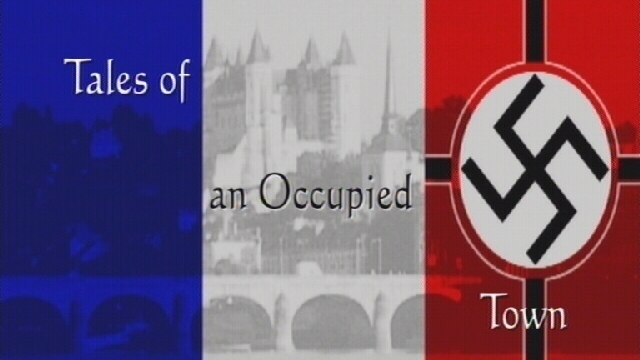Tale of an Occupied Town
The Vichy government and years of Nazi occupation are one of the most inglorious periods of French history. But what was life like for ordinary citizens during those years?
 The Vichy government and years of Nazi occupation are one of the most inglorious periods of French history. But what was life like for ordinary citizens during those years? What tactics did they adopt to survive? This evocative documentary profiles the beautiful town of Saumur under occupation. It dispels the 'Good French/Bad French' notion, focusing instead on the experiences of normal citizens. Stories of resistance heroes and collaborators, opportunists and traitors are interspersed with stunning archive to tellingly evoke the times.
The Vichy government and years of Nazi occupation are one of the most inglorious periods of French history. But what was life like for ordinary citizens during those years? What tactics did they adopt to survive? This evocative documentary profiles the beautiful town of Saumur under occupation. It dispels the 'Good French/Bad French' notion, focusing instead on the experiences of normal citizens. Stories of resistance heroes and collaborators, opportunists and traitors are interspersed with stunning archive to tellingly evoke the times.
"Occupation is worse than anything", reflects resident Jeannine Bourdin. "It's not when most people die. But it's when things that aren't very pleasant come out into the open." When the Germans invaded Saumur in 1940, many feared a bloodbath. But the occupying force was instructed to treat locals well and life initially carried on as normal.
"The French thought the most important thing was to survive", explains historian Robert Gildea. "The most dangerous thing was to get involved - whether in the resistance or as a collaborator." But this 'wait and see' policy did not mean residents were indifferent to the occupation. "They could not stand the Germans being there", states historian Alain Jacobson.
Slowly, networks of resistance crystallised. Some residents refused to host billeted Nazis. Others helped imprisoned French soldiers escape. Michel Ancelin's father was a member of the French resistance. "One night, 40 prisoners escaped. My father was asked to hide them for a night or two."
But many others capitalised on the occupation to settle old scores. "Some of Saumur's cafe owners denounced the owners of the 'Budan' bar who had not put up a sign saying 'Jewish Business'", recalls Franck Marche. Residents like Jacques Vasseur joined the French Gestapo and local authorities collaborated with the Nazis to round up Jews. "The Prefet and his men applied all the laws of the Vichy government to the letter and sometimes went even further," complains Marche. His parents were among the Jews sent to Auschwitz. Then the Gestapo infiltrated the local resistance network and arrested their members. "My leader, Jean Renard was brought in to confront us", recalls Pierre Deschamps. "His vests and shorts were soaked with congealed blood." Michel Ancelin's father was beaten into a coma, then executed. When the Germans realised they were losing the war, they began massacring civilians. Raymonde Cochin was nine years old when her parents were murdered. "The women were killed with their eyes blindfolded and the men were tortured", she describes. Finally, in August 1944, the Nazis left. But the Nazi withdrawal heralded a wave of retaliation attacks. Women suspected of having affairs with Germans had their heads shaved. "It was as if women no longer belonged to themselves but to the nation. Their bodies were an extension of national territory," reflects Marc Bergère. French Gestapo member, Jacques Vasseur, was so afraid of being targeted, he hid in his mother's attic for 17 years. Four years later, the city of Saumur was awarded the Croix de Guerre for its patriotic resistance during the years of occupation.
FULL SYNOPSIS
But many others capitalised on the occupation to settle old scores. "Some of Saumur's cafe owners denounced the owners of the 'Budan' bar who had not put up a sign saying 'Jewish Business'", recalls Franck Marche. Residents like Jacques Vasseur joined the French Gestapo and local authorities collaborated with the Nazis to round up Jews. "The Prefet and his men applied all the laws of the Vichy government to the letter and sometimes went even further," complains Marche. His parents were among the Jews sent to Auschwitz. Then the Gestapo infiltrated the local resistance network and arrested their members. "My leader, Jean Renard was brought in to confront us", recalls Pierre Deschamps. "His vests and shorts were soaked with congealed blood." Michel Ancelin's father was beaten into a coma, then executed. When the Germans realised they were losing the war, they began massacring civilians. Raymonde Cochin was nine years old when her parents were murdered. "The women were killed with their eyes blindfolded and the men were tortured", she describes. Finally, in August 1944, the Nazis left. But the Nazi withdrawal heralded a wave of retaliation attacks. Women suspected of having affairs with Germans had their heads shaved. "It was as if women no longer belonged to themselves but to the nation. Their bodies were an extension of national territory," reflects Marc Bergère. French Gestapo member, Jacques Vasseur, was so afraid of being targeted, he hid in his mother's attic for 17 years. Four years later, the city of Saumur was awarded the Croix de Guerre for its patriotic resistance during the years of occupation.
